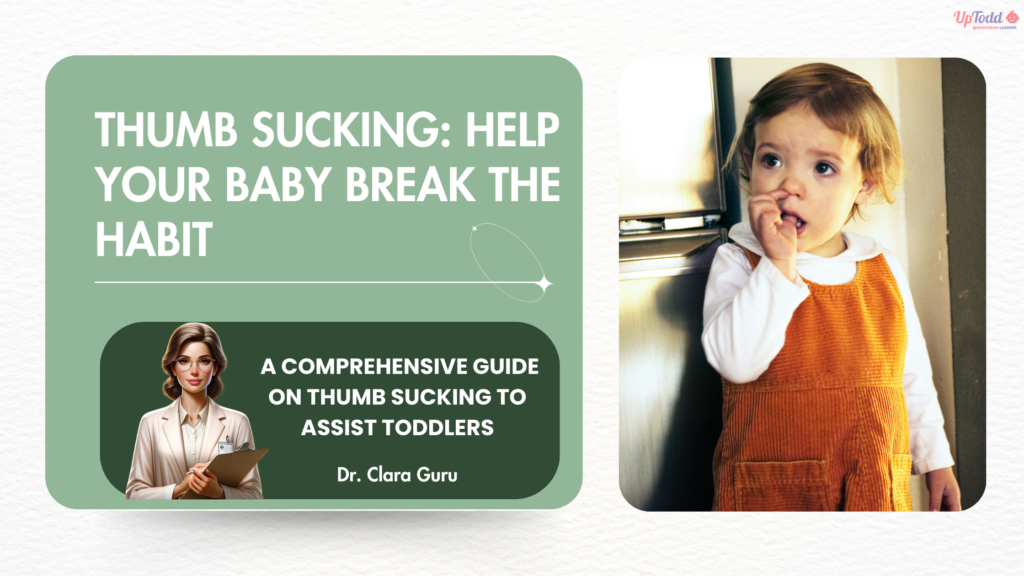
Babies have a natural urge to suck onto things. This urge usually decreases after the age of 6 months. But many babies continue to suck their thumbs to soothe themselves and engage in thumb sucking. It can become a habit in babies and young children who use it to comfort themselves when they feel hungry, afraid, restless, quiet, sleepy, or bored. So let us see what our development Expert Dr Clara Guru has to comment on it.
Thumb sucking may cause problems with children’s developing teeth and jaws if it continues as they get older.
Why do babies and toddlers suck their thumbs?
Babies have natural behaviour and sucking reflexes, which can cause them to put their thumbs or fingers into their mouths — sometimes even before birth means learn from the womb itself. Because it makes babies feel secure, some babies might eventually develop a habit of it when they’re in need of soothing or going to sleep.
How long does thumb sucking usually last?
Many children stop sucking their thumbs on their own between ages 2 and 4.
But even a child who’s stopped sucking his or her thumb might go back to the behaviour during times of stress.
Is thumb sucking bad for teeth?
Many children who suck their thumb do not have problems with their teeth. Whether it causes problems may depend on:
- Your child’s growth and development
- How often they suck their thumb
- The angle of their thumb in their mouth
- How hard they suck
It isn’t usually a concern until a child’s permanent teeth come in. At this point, it might begin to affect the roof of the mouth (palate) or how the teeth line up. The risk of dental problems is related to how often, how long and how intensely your child sucks on his or her thumb.
Possible problems caused by this habit can include:
- Your child’s upper jaw being pushed out further from their face
- Upper front teeth being pushed upwards and out, commonly called an overbite’
- Tipped back lower front teeth
- A gap between your child’s upper and lower teeth
- Not being able to bite the front teeth together
- The palate (roof of the mouth) becoming pushed up and narrow
Your child’s speech and the position of their tongue in their mouth may also be affected.
What can I do to encourage my child to stop thumb sucking?
Talk to your child about this habit. You’re more likely to be successful in stopping the habit if your child wants to stop and helps choose the method involved.
Sometimes paying no attention to this habit is enough to stop the behaviour — especially if your child uses it to get attention. If ignoring it isn’t effective, try one of these techniques:
- Use positive reinforcement. Praise your child or provide small rewards — such as an extra bedtime story or a trip to the park — when he or she isn’t thumb sucking. Set attainable goals, such as no thumb sucking an hour before bed. Place stickers on a calendar to record the days when your child successfully avoids doing it.
- Praise your baby when they’re not sucking their thumb. Offer small rewards or words of encouragement to motivate them to stop.
- When you notice your baby sucking their thumb, gently redirect their attention to a toy, book, or activity to engage their hands and mind elsewhere.
- Identify triggers. If your child sucks his or her thumb in response to stress, identify the real issue and provide comfort in other ways — such as with a hug or reassuring words. You might also give your child a pillow or stuffed animal to squeeze.
- Avoid scolding or punishing your baby, as this can create anxiety and worsen the habit.
- Provide alternative soothing methods such as a pacifier or comfort blanket. Be cautious not to replace it with another potentially problematic habit.
Final Thoughts By Dr Clara Guru
Dr Clara Guru states that thumb sucking till the age of 2-4 years can be a way of baby to express themselves and explore things orally. It also becomes as a soothing mechanism. But any thumb sucking behvaiour post that age can cause significant developmental issues that are not just limited to physical or oral aspect but can extend to their cognitive growth too. If your baby is indulged in the thumb sucking behaviour after 2-4 years of age it is always best to identify triggers and help them correct the wrong behaviour patterns developed in form of thumb sucking.
Explore UpTodd luminary pathway to unleash hidden abilities of the baby
FAQ
- Till what age is thumb sucking normal?
- How can I help my baby change thumb sucking behaviour?
- Are there any side effects of thumb sucking?
